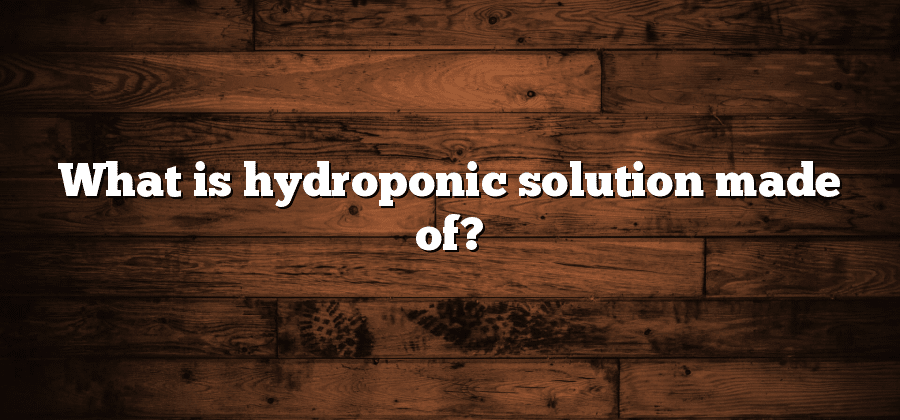Nutrient Solutions
Nutrient solutions are an essential component of hydroponic systems, providing plants with the necessary resources for optimal growth and development. These solutions contain a balanced blend of essential elements such as nitrogen, phosphorus, and potassium, along with secondary nutrients and micronutrients. By delivering a complete spectrum of nutrients directly to the plant’s root system, hydroponic nutrient solutions ensure that plants have access to all the elements they need for vigorous growth and high yields.
One of the primary advantages of using nutrient solutions in hydroponics is the ability to tailor the nutrient composition to the specific needs of different plant varieties. This flexibility allows growers to optimize their crop production by adjusting nutrient levels and ratios to suit the requirements of each particular stage of growth. Additionally, nutrient solutions in hydroponics minimize the risk of nutrient deficiencies or excesses that can occur in traditional soil-based cultivation, as plants receive a consistent supply of nutrients throughout their life cycle. With the proper formulation and management, nutrient solutions can help maximize plant health and productivity in hydroponic systems.
pH Adjusting Agents
pH Adjusting Agents play a crucial role in maintaining the optimal pH of nutrient solutions for hydroponic systems. Hydroponic gardening relies on the precise control of pH levels to ensure proper nutrient absorption and plant growth. pH adjusting agents are chemical compounds specifically formulated to raise or lower the pH of nutrient solutions as needed. They are typically in liquid or powdered form and are added in small quantities to the irrigation water.
One of the commonly used pH adjusting agents is phosphoric acid. This acid is effective in lowering the pH of nutrient solutions, making it more acidic. On the other hand, potassium hydroxide is commonly used to raise the pH and make the solution more alkaline. It is essential to note that pH levels in hydroponic systems need to be regularly monitored and adjusted to ensure the plants receive the appropriate nutrient uptake. By using pH adjusting agents, growers can maintain the optimal pH range that promotes healthy plant growth and maximizes nutrient availability.
Oxygenating Additives
Oxygenating additives play a crucial role in hydroponic systems by enhancing the amount of dissolved oxygen in the nutrient solution. This is essential for supporting the growth of healthy and vigorous plants. The addition of oxygenating additives helps to ensure that the roots have an adequate supply of oxygen, promoting efficient nutrient uptake and preventing root rot and other oxygen-related issues.
There are several types of oxygenating additives available in the market, including hydrogen peroxide and beneficial microbial products. Hydrogen peroxide, when used in appropriate concentrations, can help increase oxygen levels in the nutrient solution. It can also help control harmful pathogens and control the growth of algae in the system. On the other hand, using beneficial microbial products can help create an oxygen-rich environment by facilitating the breakdown of organic matter and promoting beneficial microorganisms that enhance nutrient absorption.
Integrating oxygenating additives into your hydroponic system can significantly improve plant growth and overall crop yield. However, it is crucial to carefully follow the manufacturer’s instructions and guidelines to ensure the correct dosage and avoid any potential negative impacts on the plants. Remember, maintaining optimum oxygen levels in your hydroponic system is key for driving successful plant growth and maximizing your harvest.
Water-Soluble Fertilizers
Water-soluble fertilizers have become increasingly popular in agriculture and gardening due to their ease of use and ability to provide nutrients in a readily available form. These fertilizers dissolve in water, allowing for quick absorption by plants through their roots. This results in faster growth, improved nutrient uptake, and overall healthier plants.
One of the key advantages of water-soluble fertilizers is their ability to be customized based on specific plant needs. By adjusting the concentration of the fertilizer in the water, growers can ensure that their plants receive the precise amount of nutrients required for optimal growth. This level of control helps prevent over or under fertilization, reducing the risk of nutrient imbalances and potential damage to the plants. Additionally, water-soluble fertilizers can be easily applied through various irrigation systems, allowing for efficient nutrient delivery to a large number of plants simultaneously.
In conclusion, water-soluble fertilizers offer numerous benefits for both large-scale agriculture and small-scale gardening. Their ability to dissolve in water and provide precise amounts of nutrients make them a valuable tool in promoting plant growth and overall crop yield. With the ability to be easily applied and customized, these fertilizers have become a popular choice among growers looking to maximize the health and productivity of their plants.
Trace Elements
Trace elements play a vital role in the overall health and development of plants. These elements, although required in small amounts, are essential for various physiological and biochemical processes within the plants. Some common trace elements include iron, manganese, zinc, copper, boron, molybdenum, and nickel.
Iron, for instance, is crucial for the synthesis of chlorophyll, which is responsible for the plant’s ability to convert sunlight into energy through photosynthesis. Manganese is involved in enzyme activation and helps in the production of proteins and photosynthetic pigments. Zinc plays a crucial role in the synthesis of growth hormones and regulates various enzymatic reactions. Copper assists in the synthesis of lignin and plays a role in the plant’s defense against pathogens. Boron is involved in cell wall formation and facilitates various physiological processes, including nutrient uptake and translocation. Molybdenum aids in nitrogen fixation and is necessary for the synthesis of amino acids and proteins. Lastly, nickel is an essential component of urease, an enzyme responsible for nitrogen metabolism.






